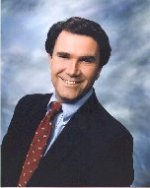Saturday
Apr242010
Who Said That?
 Saturday, April 24, 2010 at 11:28AM
Saturday, April 24, 2010 at 11:28AM  “God applies his law to the family, to the church, and to the state in different ways. The church should extend forgiveness and reconciliation to a repentant sinner . . . . [Paul] tells the Corinthian church not to act like the state and administer punishment, because it is not the state. Instead, the church is the arena of redemption where reconciliation is extended to those who are repentant.”
“God applies his law to the family, to the church, and to the state in different ways. The church should extend forgiveness and reconciliation to a repentant sinner . . . . [Paul] tells the Corinthian church not to act like the state and administer punishment, because it is not the state. Instead, the church is the arena of redemption where reconciliation is extended to those who are repentant.”
Please leave your guess in the comments section below. Please, no google searches, or cheating. Answer to follow, next week.
Update on Saturday, April 24, 2010 at 11:32AM by
 Kim Riddlebarger
Kim Riddlebarger
 Kim Riddlebarger
Kim Riddlebarger
 Believe it or not, this is a quote from Greg Bahnsen in the “Questions and Answers” section in Gary Scott Smith, ed., God and Politics, (Phillipsburg: P & R Publishing, 1989), 266.
Believe it or not, this is a quote from Greg Bahnsen in the “Questions and Answers” section in Gary Scott Smith, ed., God and Politics, (Phillipsburg: P & R Publishing, 1989), 266.


Reader Comments (16)
I like the Benedict XVI guess, so I'll repeat it.
In the Lutheran Church, the Wisconsin synod seems to retain more disciplinary power for the church in its synod then the Missouri synod does.
There is also much confusion on the types of punishment which is levied for particular sins. And it always seems that certain sins get more attention than others. I have never read anything that brought much clarity to this issue. Although I think David Van Drunen's book begins to start answering such questions with a lot more clarity.
It seems to me that this quote is from someone with a Lutheran persuasion, however, with so much confusion on the issue you never know. It also seems to have some sphere sovereignty influence in its thinking which comes from the reformed heritage. I have been influenced by both persuasions. I am a Lutheran who went to Calvin College (1990-1994). The dominant influence during the time I went to Calvin was Kuyperian transformationalism that probably erred more heavily on the the transformation of culture side. Although there was a lot of debate during that time about this issue. The Calvin econ department had developed a rather extensive and well thought out economic policy but were for the most part ignored by the powers that be in government at the time. From what I remember though the econ department did agree with what Clinton was trying to do economically at the time while the right-wing was saying the economy would get worse with Clinton's pland They also heavily critiqued the influence the right-wing Christians were having on policy issues at the time.
I'm gonna guess someone popular like Rick Warren
My point was that it could be from anyone these days. Evangelicals, like Rick Warren, could possibly say something like this because he draws from many different sources and really has no particular confession which he is bound by. His mentality seems to be to go where "the spirit" leads him. He seems to be more pragmatic and opportunistic than anything else. He goes where the action is.
Two Kingdom theology and natural law at least give us a basis on how to think about church and state issues with more clarity then what one normally encounters in America today. The quote above is somewhat vague in that it combines thinking from various traditions. Evangelicals tend to do this a lot with no consistent reason for doing so. That is the problem with evangelicalism- they have no confessional statements they adhere to and seek to defend.
It is almost impossible to tell who is saying this quote. I think that is the reason why he choose this quote. I bet it is from someone who is a evangelical leader but bound by no confessional statements. It is a source of confusion even from those who are bound confessionally.
Here's another "Who Said That?," a comment on Romans 13:
"It is not meant that God directly ordained the state by saying to man, Thou shalt set up a government or organize a commonwealth."
(James Benjamin Greene, in his Harmony of the Westminster Standards.)
:)
I wasn't trying to cheat. I was just curious. I don't post answers I google.
Cheers,
Andrew